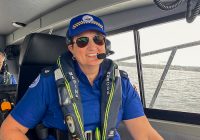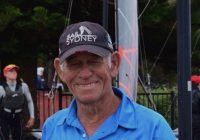On March 31, something big happened. I hit “publish” on a course that had been two years in the making. Just like that, the password protection came down and the Rec’ Fishing Fundamentals & Vocational Development course stepped into the light.
I won’t lie — it was a bit of a surreal moment. This course had become something of a needy companion over the past two years, constantly evolving, always demanding more attention. It still feels like a living thing, to be honest. I doubt I’ll ever truly finish it. But that deadline had arrived, and the world was ready to meet it.
The first thing I did after pressing the button? I took the night off. Slept like a rock for the first time in over a year. This project had pushed me in ways I hadn’t expected. The content is broad, the depth is immense, and the weight of wanting to get it right — especially for those who take it on — was heavy.
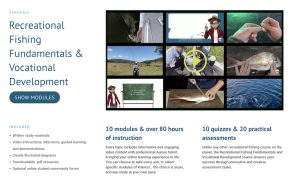
Pressing ENTER on “publish without password protection” was a nerve-wracking moment.
But the next morning brought something entirely new. There was calm in the air — a strange stillness that only comes after a massive emotional leap. The closest metaphor I can find is skydiving, and not in the Hollywood, slow-motion kind of way. I mean the genuine psychological duel you have with yourself to not just stay on the plane. I’ve jumped out of planes four times in my life, and each one begins the same: with your amygdala going into overdrive. That primal fear response kicks in, screaming at you to back out, sit down, stay safe – “there’s no shame going back down with the plane”.
But then comes the moment when you flip it a very shaky bird, step out of the plane and onto the wheel assembly, gripping the wing, adrenaline howling… Amygdala screaming “WHAT.ARE.YOU.DOING?!”. You nod to your buddies. You let go. And just like that, everything goes quiet. The fear evaporates, replaced by presence and focus. You’re not running anymore — you’re flying. It’s a calm, visceral awareness where your whole body says, “Right. We’re really doing this. Let’s bring it home.”
That’s exactly how I felt that morning. Brewing my coffee, watching the sun come up… amygdala in fight (not flight) mode. ACTION TIME! First order of the day… tell people about the course! Seeing twelve people enrol within the first hour was proof of demand. We were airborne.
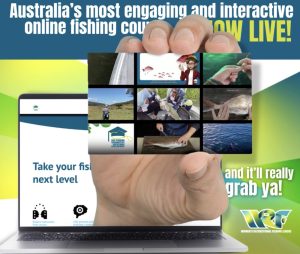
A proud launch ad by WRFL.
This course is born out of research and real stories. The 2019-21 National Recreational Fishing Survey included some findings into what holds people back from participating in fishing. Well, you guys know me well enough by now… everyone who wants to fish should be able to, right?! I set up a survey through the Women’s Rec’ Fishing League (WRFL) to discover more, particularly if it impacted what stops women fishing.
The imperative question to me was “What if the disparity in participation rates is not about perceived misogyny, as I suspected?”. Wouldn’t that be something!
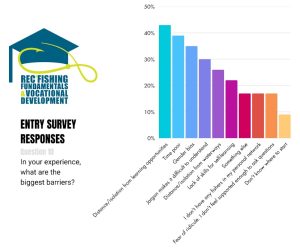
The data collected through entry and exit surveys also help inform current and future needs.
Our results correlated with the NRFS 2019-21 findings. The three highest barriers were the same across the board, with a change in dominance. The highest response from our female respondents was actually lack of time. Isolation came in second, represented by a lack of fishers in their personal network. Fear of intimidation (as in ridicule, gender bias, vilification).
It didn’t matter whether the voices were male or female — the barriers were familiar and, in many cases, deeply personal.
So, I set about creating a course that met people quietly and respectfully where they were. Something self-paced, private, and thoughtful. The kind of learning experience that builds confidence by doing and inspires curiosity without pressure.
Fishing, after all, has done this for me.
Long before I ever considered writing about it, fishing was my sanctuary. It gave me back my sense of self, helped me build capability, and taught me how to breathe again. Through small wins — like learning to back a trailer like a roadie for the Crusty Demons or tying knots that just won’t fail — I started to feel less like a dangling passenger who’d slipped out of the balloon-basket in my life and more like the woman watching the wind speeds and hitting the ignite button.
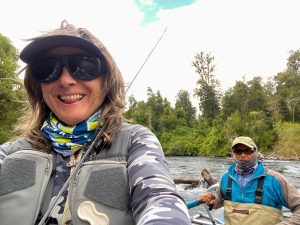
If you’d told the 2003 version of “Jo” that she’d one day take herself on a solo fly fishing charter in Patagonia, she’d have blown a gasket!
Creating this course was a way to pay that forward.
This hasn’t been a solo project. Jenny Cook came on board as an education design consultant, bringing an entirely new dimension to the work. Jenny is known for shaping traditional trades and corporate learning, and this might be the first recreational fishing course outside academia to benefit from that kind of design thinking. Her structure brought clarity to my chaos — bringing learning models such as Blooms Taxonomy to ensure method, module mapping and psychology enable content that works for all learning styles.
Then there was the team at OzFish Unlimited, generous with resources and insights, and FRDC, who somehow managed to keep the wheels turning — and me vaguely pointed in the right direction.
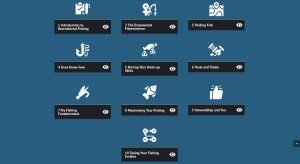
Designed to cover off every foundational skill + more, and set those inclined up for a better chance at a career in our sector, the Rec’ Fishing Fundamentals & Vocational Development course is unlike any other online fishing course.
One of the features I’m most proud of is the radar chart system. Participants self-assess their confidence and mindset at the start of each module, then again at the end. It gives both the learner and the course coordinators a window into growth and the effectiveness of each module, and I hope it offers a little spark of pride as people track just how far they’ve come.
We started from the ground up: terminology, basic gear, knots, and troubleshooting. The things that too often get brushed past or taken as easy or innate by those of us already skilled. Then we moved into stewardship, techniques, tech, and even industry pathways. There’s a whole module called The Empowered Fisherwoman, because women in this space deserve to feel seen and supported — and fishing’s history is rich with female stories and, indeed, pioneering influence. We talk openly about casting techniques for differing female bodies, tackle store overwhelm that can inspire a sort of brain-freeze in newcomers, and our bespoke jargon that acts as an “It-Girl” gatekeeper.
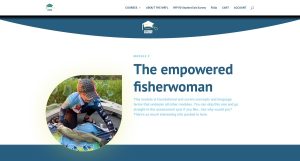
Module 1 “Introduction to Recreational Fishing” and Module 2 “The Empowered Fisherwoman” are both free, with the first being a mandatory pass to enable entry into any other chosen module. For those who have the knowledge, the quiz can be taken independent of the course, with a pass all that’s required to continue.
But this isn’t just a course for women. It’s for anyone looking to improve their fishing, whether taking first steps or thinking about consolidation and progression.
Truth be told, while I wrote this for others, I grew with it. I learned more about the science and soul of fishing. I uncovered fresh ways to improve my own practice. And I remembered how much I love teaching, especially when the learning lands so close to home.
If you’re someone who fishes, teaches, mentors, or just wants to get more out of each day on the water, there’s something in this course for you. If you know someone who could use a confidence boost or a fresh start — send them a link. I’ve donated this course to the Women’s Recreational Fishing League to help fund their incredible initiatives and support their mission to balance the gender ledger in our great sport. So every referral gives twice!
Now… it’s finally time to dust off my rods!
Until next time, FISH ON!

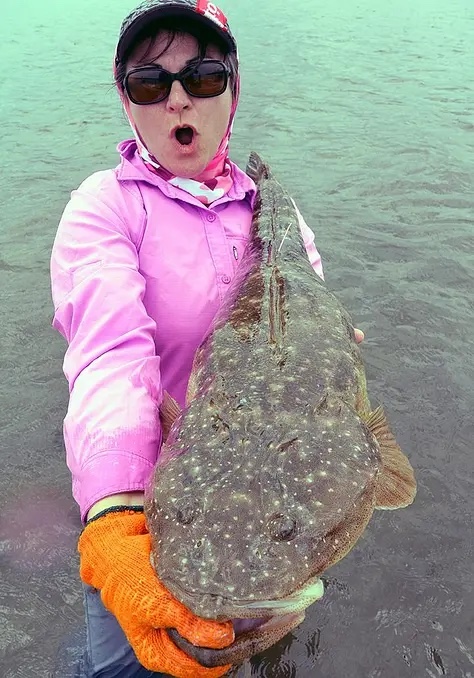
For three decades Jo Starling has worked with businesses and personalities, helping them to promote themselves in one form or another, whether through graphic design, advertising, promotions or marketing.
She has owned a fishing rod for just as long, but it’s only been in this new century that it hasn’t been allowed to gather dust.
Jo is a passionate advocate for the sport of fishing and its promotion as a healthy lifestyle for women.
To find out more about Jo visit her website HERE
Or you can visit her Fishtopia Web site HERE or on the banner below.
Jo is also the founder and National President of the Women’s Recreational Fishing League (WRFL) Inc. The work they do is very important in balancing the participation ratios of fishing in Australia, thus making the collective voices of Aussie anglers more harmonious and powerful, as well as shoring up the economy of the sector. For more information visit their Website at womensrecfishingleague.org







